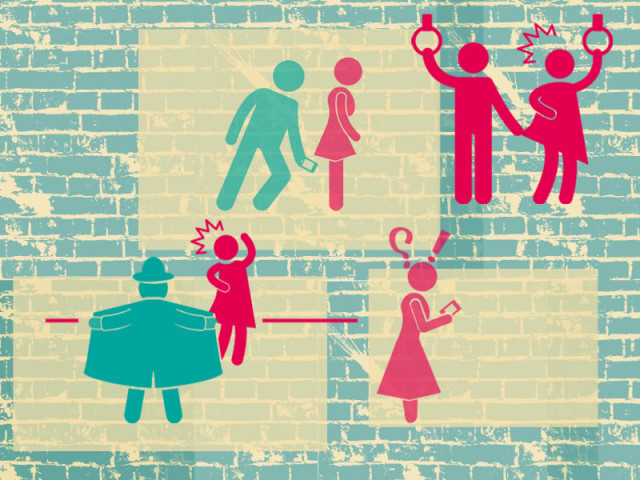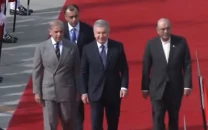Eve teasing: The power game
Despite the jocular connotations the term carries, eve-teasing is a serious issue.

Despite the jocular connotations the term carries, eve-teasing is a serious issue.
Our chivalrous Pakistani bhais would have us believe that they are too shareef to be guilty of sexual misconduct, but the Pakistani behns would beg to differ.
Take an average trip to the bazaar. The smooching sound, the brush past, and the outright poking are complemented by a high dose of gawking. While the rest of the world calls it sexual harassment, in our ‘virtuous’ part of the world it is euphemistically referred to as ‘eve-teasing’. This term stands for public or sexual harassment on the street that encompasses any act or words by which a man makes a woman feel uncomfortable and anxious.

There is considerable overlap between sexual harassment and eve-teasing, with the main difference lying in the intensity of the acts, eve-teasing being milder. While sexual harassment can be preceded by a history of interaction and usually involves a known target, eve-teasers zone in on their target on the spot and look for random opportunities. In a majority, but not all cases, sexual harassment tends to take place in closed spaces and the identity of the culprit is usually known; eve-teasing is generally experienced outdoors, usually in the marketplace or on the streets, and the teaser is an unknown male. In sexual harassment the harasser usually takes advantage of a higher rank, powerful position or physical strength. On the other hand, eve-teasing is almost a recreational activity. It is ‘fun’ for the boys. It is a difficult crime to prove and the eve-teaser takes advantage of his gender. Finally, in sexual harassment, the harasser and the victim tend to have an established contact, for example boss and employee, uncle and niece, whereas in eve-teasing, it is often their first and only encounter.
You know you’re being eve-teased when you hear those wolf whistles behind you when you go out shopping or are jabbed while getting on a bus. There are hundreds of ways to do it: whistling, ogling, making kissing sounds, sexist and sexual comments, vulgar gestures, stalking, inappropriate touching. In extreme cases, there can be outright flashing, assault or extremely inappropriate acts in public.
The target can be any age and of any social background, as can be the culprit.

Given the short time span in which it can be experienced, eve-teasing is not taken as seriously as it should by women. Actually, it has far-reaching consequences. After all, something that has been labeled ‘little rape’ by certain feminist writers cannot be mere pestering. In Bangladesh, the non-profit organisation The Hunger Project found that eve-teasing not only harms women, it actually has a negative effect on human and social development. According to their findings, eve-teased girls often drop out of school to avoid their tormentors, and because parents fear for their ‘honour’. These girls are then forced into early marriages, which has a deep impact on maternal nutrition and health. These girls become mothers at a younger age and give birth to babies with lower birth weights. So, this form of harassment contributes to maintaining the low status of women. In the book Sexual Harassment: Contemporary Feminist Perspectives, Barbara Bagilhole, who has researched and published extensively on gender, diversity and equal opportunities, says that eve-teasing in India reflects a gender bias in society, proving that males are dominant while females are helpless. In eve-teasing, a man, knowing that he is stronger than the opposite sex, uses his power to bully women. It is a power game in which the man is the predator and the woman is preyed upon. Perhaps the most alarming thing about eve-teasing is that it is the first rung on the ladder of sex crimes.
An eve-teased female feels weak and frustrated and may experience depression and low self-esteem. Being harassed on the streets can prompt her to withdraw or become constantly anxious. Dozens of girls have committed suicide in India and Bangladesh on account of eve-teasing. These findings were corroborated by the telecommunications company in Pakistan when it asked a research firm to explore the common problems faced by Pakistani youth, which were then addressed in its ad campaigns. The company discovered that eve-teasing was the most serious and widespread issue faced by young women in Pakistan and that it hinders their chances of progress by limiting them to their homes.

At the same time, the seriousness of the issue is downplayed by the ‘playful’ connotations associated with the term ‘eve-teasing’. By referring to the victim as ‘Eve’, it is almost as if women were temptresses bent on inciting innocent men into improper conduct. This appears to be a chronic problem in harassment cases — the victim is often made out to be culpable. When I started talking to women — and men — about eve-teasing, I found that women change their attire in response to being harassed. However, despite the generally modest attire that is observed on the streets, there doesn’t appear to be any decline in harassment. “Any woman who reports harassment always mentions what she was wearing,” says Ambreen Ajaib, who is a psychologist at the NGO Bedari. Bedari handles the issue of sexual harassment but only about 50 to 70 women contact them per year.
In Pakistan, no proper research studies have been carried out on this topic. It is hard to even estimate figures for sexual harassment cases. “It’s difficult to get exact figures because few women have access to us and because many women believe that the fault lies with them — that a woman normally lures the man and that if she is dressed a certain way she will be harassed,” says Ajaib.
In India, organisations such as the Blank Noise Project, an anti-street-harassment initiative, and anti-eve-teasing laws in Bangladesh are successfully playing their part in curbing this menace. An ‘Anti Eve Teasing Day’ is celebrated in Bangladesh every year to highlight the issue. In Pakistan, there’s a ‘Protection against Harassment at the Workplace Act 2009’ and Dr Fouzia Saeed, a founding member of the Alliance Against Sexual Harassment (Aasha), is hopeful that this law will help fight sexual harassment.
Published in The Express Tribune, Ms T, July 7th, 2013.
Like MsT on Facebook, follow @TribmagMsT on Twitter for your dose of girl talk.



















COMMENTS
Comments are moderated and generally will be posted if they are on-topic and not abusive.
For more information, please see our Comments FAQ